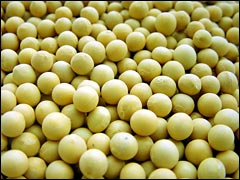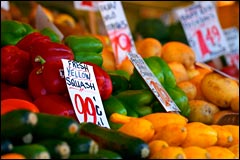Climate Food and Agriculture
All Stories
-
Filet of the Land
New studies give conflicting advice about the benefits and risks of eating fish Two studies released yesterday are likely to confuse you even further about the benefits and risks of eating fish. A report from the Harvard School of Public Health claims that fish consumption can reduce the risk of coronary death by 36 percent, […]
-
Take Me to Your Weeder
Solar-powered robot could pick weeds and reduce herbicide use Here’s an innovative idea for limiting herbicide use: A solar-powered robot with 20/20 vision and depth perception that uses GPS navigation to search out and destroy weeds. As it moves along at three miles per hour, the two-foot-tall, five-foot-long robot, designed by engineers at the University […]
-
The Killing Fields
Study links breast cancer to farm work October is Breast Cancer Awareness Month. Think that has nothing to do with the environment? Guess again. A new study of women in Windsor, Ontario, found that those who have worked on a farm are 2.8 times more likely to develop breast cancer than those who haven’t. The […]
-
Senators threaten to impose industrial-strength rules on small vegetable farms
Salad greens thrive in the fall; they love brisk, cool nights and mild, sunny afternoons. Meet your greens. Photo: iStockphoto Here in western North Carolina, members of my farm’s CSA (community-supported agriculture) program are enjoying salad mixes that include spicy arugula, mizuna, and purple Osaka leaves, along with bitter endive, earthy shinginku — and yes, […]
-
Can industrial agriculture withstand climate change?
If the fossil fuels don’t getcha, the genetics will. Photo: iStockphoto In the United States, the clearest signs of climate change so far have been stern words from Al Gore and a few hotter-than-normal summers. In Greenland, by contrast, global warming has sparked a revolution — at least, when it comes to agriculture. A recent […]
-
Why the Hudson Insitute needs to compost its manure a little better.
Very few people are actually passionate about industrial food. Sure, people will buy rock-hard and flavorless tomatoes from the supermarket without thinking much about it, but they won't get mad because, say, there's a farmers' market down the road where someone's selling flavorful heirloom tomatoes grown without chemicals.
Alex Avery of the Hudson Institute -- funded lavishly by right-wing foundations and agribiz giants -- is a different breed altogether. Indeed, it's as though Monsanto conjured him up in a test-tube: the fellow seems to have a congenital hatred of organic food -- and a burning desire to make you hate it, too. His preferred method for achieving his goal is fear.
Take the BS he's been spreading about the recent E. coli outbreak affecting pre-washed, bagged spinach, on Gristmill and elsewhere.
-
Why the new “Green Revolution” in Africa may be misguided
In a bid to move “tens of millions of people out of extreme poverty” and “significantly” reduce hunger, the Bill & Melinda Gates Foundation has teamed with the Rockefeller Foundation to launch a new “Green Revolution” in Africa. These high-profile foundations have committed a combined $150 million toward fulfilling their admirable goals. But a look […]
-
The Times a bit too flowery on China’s growing rose industry
China is positioning itself to take the lead in world rose production. Government leaders hope investing in the flower industry will bring capital and jobs to southwestern China, and florists in the U.S. see it as an opportunity to obtain cheaper products, thereby increasing profits.
Workers in the burgeoning rose industry are mostly young women, earning an average of $25 per month, which the NYT article at least points out. Missing from the piece, though, is any thought to the health, labor, and environmental effects of the flower industry, or to how China's flower project could engage with fairer standards.
-
Is Monsanto playing fast and loose with Roundup Ready Soybeans in Argentina?
Crying not for Argentina but for lost patent fees, Monsanto’s legal hacks are in European courts suing to block millions of tons of Argentine soybean meal from docking on the continent. Bean there, sprayed that. Photo: iStockphoto Monsanto says that much of the meal crossing the Atlantic to feed Europe’s cows and pigs contains traces […]
-
Some farmers’ markets aren’t as local as you think
Kathy Webb stands in front of a group of 20 people in the dining room of her Asian restaurant, talking about locally grown food. As she describes how nearly all the ingredients in the five-course dinner she’s about to serve — from the tomatoes and herbs in the salad to the berries in the dessert […]

